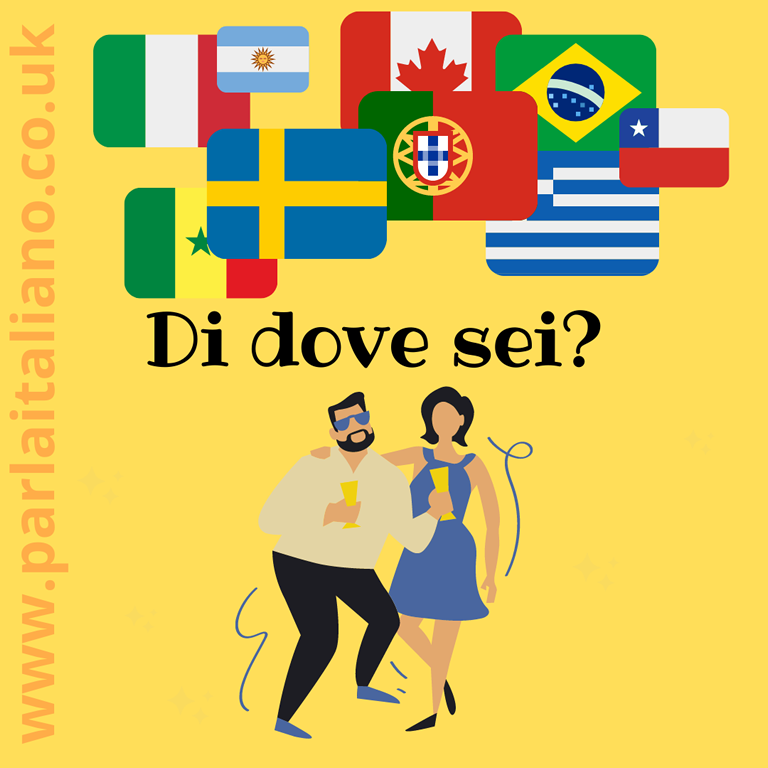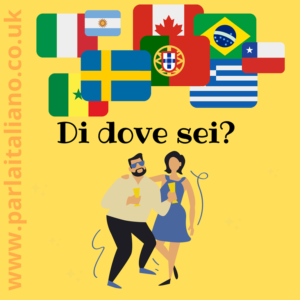Countries and nationalities are written and pronounced differently – in most cases – in Italian.
In this blog I will answer some of the main questions about countries, nationalities and grammar rules related to this topic. Therefore, if you wish to know:
- How to say nationalities in Italian?
- Where can I find a list of nationalities in Italian?
- Adjectives of nationalities in Italian, what is the rule?
- Masculine and feminine of Italian nationalities
- What is the plural of nationalities?
- How to ask where someone is from, in Italian? And how to answer.
Please read on…
How to say nationalities in Italian?
Here is a video to hear how to pronounce some nationalities in Italian:
Here is a list of some of the main nationalities.
List of nationalities
How to say nationalities in Italian.
| Nazione (Country) | Nazionalità (Nationality) |
| Afghanistan | afgano |
| Algeria | algerino |
| Argentina | argentino |
| Austria | austriaco |
| Australia | australiano |
| Bangladesh | bengalese |
| Belgio | belga |
| Bolivia | boliviano |
| Brasile | brasiliano |
| Bulgaria | bulgaro |
| Canada | canadese |
| Cile | cileno |
| Cina | cinese |
| Colombia | colombiano |
| Croazia | croato |
| Danimarca | danese |
| Egitto | egiziano |
| Finlandia | finlandese |
| Francia | francese |
| Galles | gallese |
| Germania | tedesco |
| Giappone | giapponese |
| Grecia | greco |
| Islanda | Islandesi |
| India | indiano |
| Indonesia | indonesiano |
| Inghilterra | inglese |
| Iran | iraniano |
| Irlanda | irlandese |
| Islanda | islandese |
| Italia | italiano |
| Libia | libico |
| Marocco | marocchino |
| Messico | messicano |
| Norvegia | norvegese |
| Olanda | olandese |
| Pakistan | pachistano |
| Perù | peruviano |
| Polonia | polacco |
| Portogallo | portoghese |
| Regno Unito/Gran Bretagna | britannico |
| Repubblica Ceca | ceco |
| Repubblica Slovacca | slovacco |
| Romania | rumeno |
| Russia | russo |
| Scozia | scozzese |
| Senegal | senegalese |
| Serbia | serbo |
| Spagna | spagnolo |
| Svezia | svedese |
| Svizzera | svizzero |
| Stati Uniti | statunitense |
| Tailandia | tailandese |
| Tunisia | tunisino |
| Turchia | turco |
| Ucraina | ucraino |
| Ungheria | ungherese |
| Vietnam | vietnamita |
Adjectives of nationalities in Italian
Nationalities are adjectives and they follow the grammar rule of all adjectives, this means that they change ending to agree to the noun’s gender (feminine/masculine) and number (singular/plural). For example:
An Italian man = Un uomo italiano (singular masculine)
Two Italian men = Due uomini italiani (plural masculine)
An Italian woman = Una donna italiana (singular feminine)
Two Italian women = Due donne italiane (plural feminine)
What is an adjective?
An adjective is a word added to a noun to describe it. For example, some adjectives for the noun uomo (man) could be buono (good), intelligente (intelligent), italiano (Italian), so you can say: è un uomo italiano, intelligente e buono.
The two categories of Italian adjectives
Adjectives usually belong to two categories in Italian, adjectives which, in the masculine singular, either end in -o or in -e.
For example:
| -O | -E |
| buon-o | intelligent-e |
| italian-o | ingles-e |
| tedesc-o | svedes-e |
The adjectives of nationalities ending in -ese will have the -e ending so they belong to that category.
Feminine and masculine of adjectives
In Italian every noun is either feminine or masculine and the end of the adjective must agree with the gender of the noun.
For example:
| Masculine | Feminine | Masculine | Feminine |
| italian-o | italian-a | ingles-e | ingles-e |
| tedesc-o | tedesc-a | svedes-e | svedes-e |
However, as you can see, if a noun ends in -e, it does not change in the feminine.
What is the plural of nationalities in Italian?
The plural of nationalities is the same as the plural of adjectives and it is as in the table below. In other words if an adjective, in the singular masculine ends in -o, in the plural it will end in -i, etc:
| Singular | Plural |
| Masculine | |
| – O
– E |
– I
– I |
| Example:
italian-o finlandes-e |
italian-i finlandes-i |
| Feminine | |
| – A
– E |
– E
– I |
| Example:
italian-a finlandes-e |
italian-e finlandes-i |
Some exceptions
Some nationalities do not follow the rule, for example:
Belgio – belg-a
Vietnam – vietnamit-a
Are nationalities capitalized in Italian?
In Italian nationalities are not capitalized nor are languages. Conversely, Countries are always written with a capital letter.
Therefore, to say: I am Italian, I live in Italy and I speak Italian, you say:
Sono italiana, vivo in Italia e parlo italiano.
As well as countries, cities and continents are also written with the capital letter.
How do you ask someone, where s/he if from?
Here are some useful phrases:
Di dove sei? = where are you from? (informal)
Di dov’è? = where are you from? (formal)
To answer you can say:
Sono + nationality
Therefore, you can say: sono inglese
Or you can be more specific and say:
Sono + di + city
For instance: sono inglese di Londra








